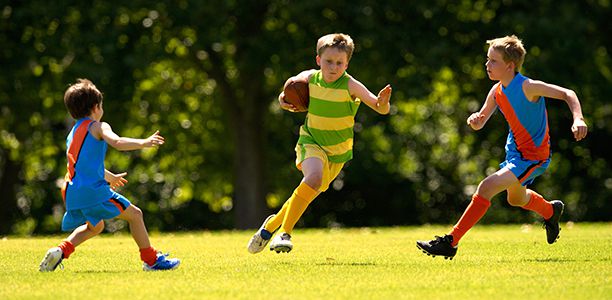Australia’s first report card on physical activity for children and young people has been released today – and its broad message is “sport is not enough”.
The report has found that while a large number of children are obtaining some of their weekly physical activity from organised sport, it is still not enough when measured against overall physical activity levels.
Report card lead investigator Dr Grant Tomkinson from the University of South Australia’s School of Health Sciences says it is important to understand that participation in sport does not necessarily mean that children and young people meet the recommended levels of physical activity – or that everyone has an equal exposure to sport.
“Australia is a sporting nation and sport is an integral part of our national identity, which is reflected in the large number – 64 to 85% – of Australian children and young people who participate in some form of organised sport or physical activity,” Dr Tomkinson says.
“However, despite these participation rates, participation in other forms of physical activity – such as active transport and leisure time physical activity – that contribute to overall physical activity levels are low and declining.
“Likewise, many Australian children and young people, even those who participate in sport and meet the recommended Australian physical activity guidelines, are engaging in levels of recreational electronic screen use and other sedentary behaviours that are likely to adversely affect their health, growth and development.”
The Active Healthy Kids Australia 2014 Report Card on Physical Activity for Children and Young People has assigned school report-style letter grades to 12 different indicators of physical activity.
Indicators and their report card grades include:
- Overall physical activity levels: D-
- Organised sport and physical activity participation: B+
- Sedentary behaviours: D-
- Government strategies and investment: C+
- Community and built environment – infrastructure, policies, programs, safety: A-
- Family and peers – infrastructure, support and parental/peer behaviour: C
- School – infrastructure, policies and programming: B-
The report card was developed using data from a number of national and state-based surveys.
The National Heart Foundation of Australia and Exercise and Sports Science Australia are the primary and secondary strategic and endorsing partners of Active Healthy Kids Australia, while the research that underpins the report card was made possible by involvement from universities and research institutes including UniSA, Curtin University, Deakin University, the University of Newcastle, The University of Queensland, the University of Sydney, the University of Wollongong, the University of Melbourne, Mater Research and CHEO Research Institute.
The research working group’s lead investigators were UniSA’s Dr Tomkinson, Professor Timothy Olds and Dr Natasha Schranz.
Dr Tomkinson says the group aims to release a report card annually so Australians are kept informed about the physical activity and sedentary behaviours of their children and young people.
Read the Active Healthy Kids Australia ‘Is Sport Enough’ media release and download the report here.
(Source: University of South Australia)










